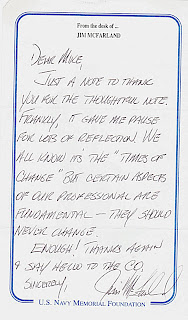
MCPON West’s message
Pass to all command master chiefs, chiefs of the boat, command senior chiefs and senior enlisted leaders and conduct training on CPO standards and Navy core values within the CPO mess.
Senior enlisted leaders, during the past several weeks we’ve had several incidents of CPO misconduct. Also during the past year, CPOs have been involved in several incidents regarding DUIs, sexual assaults, domestic violence, fraternization and general misconduct. This is unacceptable within our mess and must stop immediately.
Additionally, during the past year we’ve detached for cause ten CMCs and COBs for some of the same practices mentioned above, as well as poor performance in leading a mess.
CPO DUIs are a mess failure, and a leadership issue that must be addressed. As a mess, we have averaged 54 per year since 2005. This represents a trend and average we must reverse now. This number indicates that some within our mess are not looking after themselves or one another. There is no doubt in my mind that this type of conduct has a negative effect on the Sailors we lead.
As chiefs, we are the leaders and bearers of standards for our sailors twenty-four hours a day, seven days a week. The way we live our core values and Navy ethos are emulated by the Sailors we are privileged to lead.
I’ve asked each fleet and force master chief to brief me on any CPO involved in a DUI, sexual assault, domestic violence, fraternization or general misconduct. This brief will explain how the CMC and the mess involved expect to provide a course correction so this doesn’t reoccur. This process will be implemented in a manner that does not interfere with ongoing investigations and respects the authority of the chain of command to take administrative or disciplinary action as appropriate.
Shipmates, overall our mess remains strong. You are leading this Navy and doing it well, but even one miscue from a chief petty officer resonates and reflects poorly on the entire chief’s mess and our great Navy.
We as leaders have the responsibility to uphold the credibility this mess has earned over the course of a century. Leadership is counting on you, your Sailors are counting on you and I am counting on you.
Keep an eye on one another, take swift and appropriate action if you see someone steering the wrong course, don’t be afraid to ask questions if you see something that your instincts tell you may be unusual, and always set the standards for the Sailors you serve.
Chiefs, anchor up.
MCPON West
MCPON and I are on the same page. I take credit for coining this phrase ("ANCHOR UP") several years ago and it was published in my September 2007 USNI PROCEEDINGS article "Anchor Up, Chiefs. Reset Your Mess" - just in time for the promotion of the FY08 Chief Petty Officers. You can read it HERE at the Chief's own GOATLOCKER website. I am honored that the Chiefs thought enough of the article to post it for their Mess to read.



















